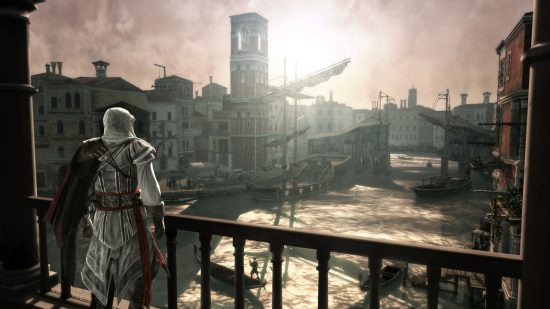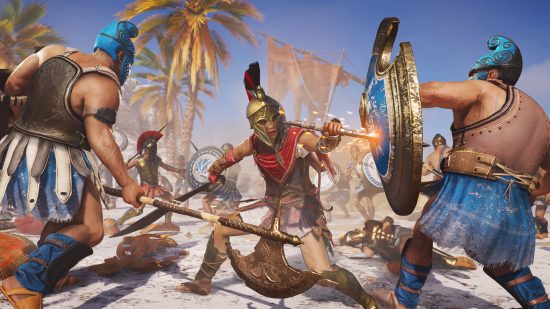Assassin’s Creed, the sweeping stealth RPG game from Ubisoft, has lofty ambitions when it comes to scale and historical scope. The games have a lot to tell you – start up Assassin’s Creed: Syndicate, and before you take even a single step as Jacob Frye, there’s an in-game message prompting 50-plus “codex entries” that are available to read. It’s perhaps admirable, in a way, this long-form commitment to facts and information, but if the AC series is going to stay fresh, Assassin’s Creed: Mirage, which launches ahead of Codename Red and AC: Infinity, needs to be shorter, smaller, and more focused on stealth.
There’s this common conflation in videogames – with Assassin’s Creed being a premier examples – between quantity and value. From developers to players, “more” is synonymous in gaming with “better” – longer playtimes, varied features, and different playable modes are the signifiers of a good, or at least “worth your money” videogame.
This goes back about as far as I can remember: in 1997, Final Fantasy VII felt like it was a more valuable and quality game because it came on three discs rather than one. But I think the butterfly that flapped its wings, and caused our current dynamic where anything below 20 hours, and without open-world elements is likely to be regarded as less valuable, is Assassin’s Creed 2.
Assassin’s Creed 2 was a fawning, grovelling apology for the first Assassin’s Creed. If the first game had you doing the same follow/listen/assassinate missions over and over again, Assassin’s Creed 2 had sidequests, customisation, your own personal mansion, and multiplayer-driven spinoffs. It created a kind of template for open-world games thereafter. From Far Cry to MGS 5, and even something smaller scale like Remedy’s Control, that format, whereby you travel between map sectors, start with small quests, work your way up to a boss encounter, use the resources and points you’ve gained to upgrade yourself, and then repeat with the next zone, finds its initial, defining form in AC 2. At the time it was unbelievable – so much to do! So much to see! They’ve really listened to the fans!

But in the last 13 years, Assassin’s Creed has expanded, swelled, and gorged on itself (and other games, including and especially from Ubisoft, have copied its format to such an extent) that it feels difficult to assign it any credible identity. It’s a stealth action RPG puzzle platformer set in the past and future, following the Greeks, Vikings, Knights, Templars, alongside the American, and French Revolutions, in Victorian London, and Renaissance Italy, and Ancient Egypt, and Syrian Holy Lands, across 12 main games and several spin-offs encompassing single-player and multiplayer.
I suppose that sounds almost standard nowadays for a big gaming franchise, but when it comes to delivering something cogent and solid about its respective historical periods, or an intelligible story, or systems and mechanics that are focused and refined, it feels as if Assassin’s Creed is spread way too wide, and so I offer some potential changes that I would like to see made for Assassin’s Creed: Mirage.

First, drop the futuristic stuff. That Desmond Miles, Abstergo, Animus frame narrative, I’ve always suspected it was a concession made to convention and marketability in the first Assassin’s Creed that ended up just sticking – in 2007, a game set entirely within 11th-century Damascus might have been viewed as too unusual, too new, and too likely to distance action and RPG game fans, so the modern-day narrative was built around and on top of Assassin’s Creed to try and make it more accessible and palatable.
But all it’s really done is make AC more contrived. Which one sounds better? A game where you play an assassin in Ancient Greece, or a game where you play someone who becomes an assassin in Ancient Greece by lying inside a machine that creates a virtual reality simulation out of their biologically encoded memories? I would say it’s the first one – simpler, firmer, and more true to the AC series’ ambitions towards capturing history. So, Assassin’s Creed: Mirage can just cut out the middle person. I want to play as an assassin in ninth-century Baghdad. I don’t want to play as someone who themselves is playing as an assassin in ninth-century Baghdad.
Second, I don’t think that Assassin’s Creed needs to be an RPG any more. In 2009, with the release of AC 2, the size of Ubisoft’s game world and the myriad options and paths it offered to players was – if not unique – then at least distinctive and laudable in how expertly it was delivered. Now, to make a kind of rhetorical generalisation, it’s like everything is an RPG; everything is open-world. The same size, scale, and variation that once made Assassin’s Creed stand out is now what makes it feel like every other videogame.
If the series needs its identity back, if Assassin’s Creed might become again what it once was, a videogame like no other, it needs to be shorter, leaner, and committed to maybe sacrificing player freedom and expression for the sake of its historical drama. Put more simply, I would rather a 10-hour game that handholds me through a series of deliberately designed missions and moments, and in the process offers a cohesive, perhaps even subjective view of history, than a 40-plus-hour game where I can do whatever I want, and the history is laid out for me, like so many books in a library.

I think you learn and feel more in a game when the developer, as it were, remains on hand to guide you through its various pretensions. Assassin’s Creed, particularly in recent years, feels incredibly lonely, like Ubisoft is simply loosing us into a jungle of missions, things to do, and things to see, but without offering the required – and much more fulfilling — context and guidance.
And lastly, I would like Assassin’s Creed to abandon its ongoing and serial narrative – rather than hooking everything together with Knights, Templars, and this ever-present historical conflict, I would sooner each game serve as a standalone episode in a kind of anthology, with their own characters, own settings, and own start-and-finish stories.
It’s the infinitude of Assassin’s Creed that is really starting to weaken it, the endlessness and, as a result, thinness and diffuseness of its plot that never seems to reach any kind of conclusion, and gets dragged over into each successive game via increasingly contrived premises. One game, one setting, one plot. Next game, a different setting, different characters, and a plot that begins and ends without any attempts to build an encompassing, multi-entry “universe”.
Focusing on a specific place in history each time, without needing to conjure in all the storyline baggage from three or four or five games ago, would let Assassin’s Creed give more attention to the details, finer points, and realities of their settings. Queen Victoria could just be Queen Victoria, rather than being manipulated from behind the scenes by the Knights Templar. From there, Assassin’s Creed could seriously start to explore the facts of history and deliver some more potent drama as a result.
Will any of this happen? The cynic in me says absolutely not. Meanwhile, the part of me that hates the part of me that’s a cynic wants to think so – possibly, maybe. Assassin’s Creed: Infinity, the ostensible multiplayer hub designed to somehow tie the whole franchise together, causes me doubt, even from its name. Mirage, Codename Red, and Codename Hexe however, which seem to be positioned as smaller games, isolated from the main body of AC, give me a little hope.

When the first game launched in 2007, I admired its vision, its commitment, so to speak, “to the bit”. A stealth game set in 11th century Syria. In the time of Call of Duty 4, Halo 3, and the long tail of Gears of War, Assassin’s Creed – conceptually at least – felt like something completely different. Thanks to its own success, and dozens of games emulating the format laid down in AC 2, the series now is basically like everything else. Given a bit of a reboot, a hard reset, and a re-commitment to some of its initial aspirations, Assassin’s Creed could be made much better.
If you’re a big Assassin’s Creed fan, you might want to try some other great open-world games. There are also some fantastic stealth games on PC, as well as sandbox games where you can explore even further your inner hit-person.
